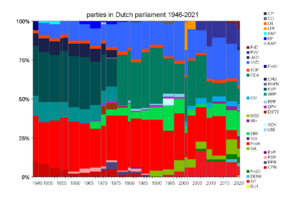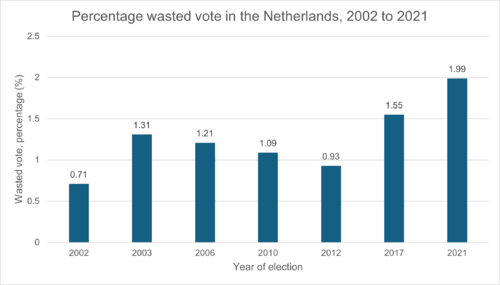House of Representatives (Netherlands) facts for kids
Quick facts for kids House of RepresentativesTweede Kamer der Staten-Generaal |
|
|---|---|
| States General of the Netherlands | |
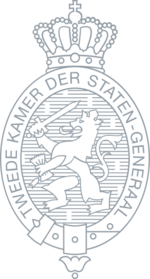 |
|
| Type | |
| Type | |
| Leadership | |
|
Speaker
|
Martin Bosma, PVV
Since 14 December 2023 |
|
First Deputy Speaker
|
Tom van der Lee, GL–PvdA
Since 19 December 2023 |
|
Second Deputy Speaker
|
Roelien Kamminga, VVD
Since 19 December 2023 |
| Structure | |
| Seats | 150 |
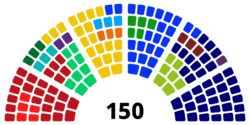 |
|
|
Political groups
|
Government (41) (demissionary) Opposition (109) |
| Elections | |
| Open party-list proportional representation (D'Hondt method) | |
|
Last election
|
22 November 2023 |
|
Next election
|
On or before 15 March 2028 |
| Meeting place | |
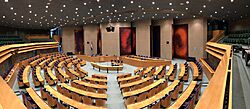 |
|
| Binnenhof, The Hague (closed due to ongoing renovations) |
|
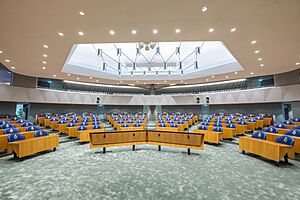 |
|
| Bezuidenhoutseweg 67, The Hague (temporary) |
|
The House of Representatives (Dutch: Tweede Kamer der Staten-Generaal [ˈtʋeːdə ˈkaːmər dər ˈstaːtə(ŋ) ˌɣeːnəˈraːl] (![]() listen), literally "Second Chamber of the States General", or simply Tweede Kamer) is the lower house of the bicameral parliament of the Netherlands, the States General, the other one being the Senate. It has 150 seats, which are filled through elections using party-list proportional representation. Generally, the house is located in the Binnenhof in The Hague, however, it has temporarily moved to the former building of the Ministry of Foreign Affairs at Bezuidenhoutseweg 67 in The Hague while the Binnenhof is being renovated.
listen), literally "Second Chamber of the States General", or simply Tweede Kamer) is the lower house of the bicameral parliament of the Netherlands, the States General, the other one being the Senate. It has 150 seats, which are filled through elections using party-list proportional representation. Generally, the house is located in the Binnenhof in The Hague, however, it has temporarily moved to the former building of the Ministry of Foreign Affairs at Bezuidenhoutseweg 67 in The Hague while the Binnenhof is being renovated.
Contents
Name
Although the body is officially called the "House of Representatives" in English, it is not a direct translation of its official Dutch name, the "Second Chamber of the States General", "Second Chamber" or more colloquially just the "Chamber". Rather than "representative" (afgevaardigde), a member of the House is referred to as (Tweede) Kamerlid, or "member of the (Second) Chamber".
Functions
The House of Representatives is the main legislative body of the States General, where discussions of proposed legislation and review of the actions of the cabinet take place. Both the Cabinet and the House of Representatives itself have the right to propose legislation; the House of Representatives discusses it and, if adopted by a majority, sends it on to the Senate. Review of the actions of the cabinet takes the form of formal interrogations, which may result in motions urging the cabinet to take, or refrain from, certain actions. No individual may be a member of both parliament and cabinet, except in a caretaker cabinet that has not yet been succeeded when a new House is sworn in.
The House of Representatives is also responsible for the first round of selection for judges to the Supreme Court of the Netherlands. It submits a list of three names for every vacant position to the Government. Furthermore, it elects the Dutch Ombudsman and their subsidiaries.
Elections
The normal term of the House of Representatives is four years. Elections are called when the government loses the parliament's confidence, the governing coalition breaks down, the term of the House of Representatives expires or when no governing coalition can be formed.
Parties
Anyone eligible to vote in the Netherlands also has the right to establish a political party and contest elections for the House of Representatives. Parties wanting to take part must register 43 days before the elections, supplying a nationwide list of no more than 50 candidates, or no more than 80 if the party won at least 15 seats in the previous election. Parties that did not contest or did not win any seats in the previous election must also pay a deposit (€11,250 for the March 2021 election, for all districts together) and provide thirty signatures of support from residents of each of the twenty electoral districts in which they want to collect votes.
Party lists
Candidate lists are given to voters at least 14 days before the election. Each candidate list is numbered, with the candidate in the first position being known as the lead candidate. The lead candidate is usually appointed by the party to lead its election campaign, and is almost always the party leader and candidate for Prime Minister. Parties may choose to compete with different candidate lists in each of the twenty electoral districts, but as seats are allocated on a national rather than district level, most parties have (almost) identical lists in all districts with candidates running. Only large parties sometimes have a number of regional candidates at the bottom of their lists. From 1973 until its abolition in June 2017, it was possible for two or more parties to combine their separate lists to increase the chance of winning a remainder seat. This was known as a list combination.
Registration and voting
Citizens of the Kingdom of the Netherlands aged 18 and over have the right to vote. Eligible citizens residing in the Netherlands are automatically invited to vote through their mandatory registration in a municipal population register. Eligible citizens living outside of the Netherlands can permanently register to vote at the municipality of The Hague, provided they have a current Dutch passport or identity card. Residents of the constituent countries Aruba, Curaçao and Sint Maarten can only vote if they have spent at least ten years residing in the Netherlands or work for the Dutch civil service.
Prisoners serving a term of more than one year and in addition have been given the additional penalty of having their voting rights retracted. From 2009 onwards mentally incapacitated citizens have regained the right to vote.
A single vote can be cast for any one candidate. Most voters vote for one of the lead candidates. Voters can give a preference vote for a candidate lower down the list.
Allocation of seats
Once the votes have been counted, the seats are allocated to the parties. The number of valid national votes cast is divided by 150, the number of seats available, to give a threshold for each seat (the Hare quota); 1/150th is approximately 0.67% of the valid votes. Each party's number of votes is divided by this threshold, and rounded down to the nearest whole number, to give an initial number of seats equal to the number of times the threshold was reached. After the initial seats are allocated, the remainder seats are allocated among the parties that received at least one seat, using the D'Hondt method of largest averages. This system slightly favours the larger parties. Since parties that received fewer votes than required to obtain one whole seat are not eligible for remainder seats, there is a de facto election threshold of 0.67%. This threshold is one of the lowest for national parliaments in the world, and there are usually multiple parties winning seats with 2% or less of the vote. Any party that did not have seats in the House at the time of the election will have its deposit refunded if it receives more than 75% of the threshold (1/200th of the vote).
Once the number of seats allocated to each party is known, they are usually allocated to candidates in the order in which they appear on the party's list. Hence, before an election, candidates near the top may be described as being in an electable position, depending on the number of seats that the party is likely to obtain. At this stage, however, the preference votes are also taken into account. Any candidate receiving more than one quarter of the threshold on personal preference votes (the preference threshold, 0.1675% of the total number of valid votes), is considered elected in their own right, leapfrogging candidates higher on the list. After the November 2006 elections, only one candidate received a seat exclusively through preference votes, while the 26 other candidates who reached the preference threshold were already elected based on their position on the list. If a candidate cannot take up the position in parliament (e.g., if they become a minister, decide not to enter parliament, or later resign) then the next candidate on the list takes their place.
Formation of governing coalition
After all seats are allocated, a series of negotiations take place in order to form a government that, usually, commands a majority in the chamber. Since 2012, the House of Representatives appoints a "scout" to ask the major party leaders about prospective coalitions. On basis of the scout's interviews, the House of Representatives then appoints an informateur, who checks out possible coalitions, and a formateur, who leads negotiations. Before 2012, the informateur and formateur were appointed by the monarch. It typically takes a few months before the formateur is ready to accept a royal invitation to form a government and become prime minister. All cabinet members must resign from parliament, as the constitution does not allow a cabinet member to simultaneously hold a seat in the House of Representatives.
Due to the nationwide party-list system and the low election threshold, a typical House of Representatives has ten or more parties represented. Such fragmentation makes it nearly impossible for one party to win the 76 seats needed for a majority in the House of Representatives. Since the current party-list proportional representation system was introduced in 1917, no party has approached the number of seats needed for an outright majority. This fragmentation also makes it almost prohibitively difficult to win enough seats to govern alone. The highest number of seats won by a single party since then has been 54 out of 150, by the CDA in 1986 and 1989. Between 1891 and 1897, the Liberal Union was the last party to have an absolute majority of seats in the House of Representatives. All Dutch cabinets since then have been coalitions of two or more parties.
Composition
Historical compositions
Historically, there have been 100 seats in the House of Representatives. In 1956, this number was increased to 150, at which it remains today.
To give an overview of the history of the House of Representatives, the figure on the right shows the seat distribution in the House from the first general elections after World War II (1946) to the most recent election. The left-wing parties are located towards the bottom, while the Christian parties are located in the centre, and the right-wing parties towards the top. Occasionally, single-issue (or narrow-focus) parties have arisen, and these are shown at the extreme top. Vertical lines indicate general elections. Although these are generally held every four years, the resulting coalition governments do not always finish their term without a government crisis, which is often followed by new elections.
Current composition
The composition of the House of Representatives as of the 2023 general election is shown in the table below.
| Group | Leader | Seats | |
|---|---|---|---|
| Party for Freedom | Geert Wilders |
|
|
| GroenLinks–PvdA | Frans Timmermans |
|
|
| People's Party for Freedom and Democracy | Dilan Yeşilgöz |
|
|
| New Social Contract | Pieter Omtzigt |
|
|
| Democrats 66 | Rob Jetten |
|
|
| Farmer–Citizen Movement | Caroline van der Plas |
|
|
| Christian Democratic Appeal | Henri Bontenbal |
|
|
| Socialist Party | Jimmy Dijk |
|
|
| DENK | Stephan van Baarle |
|
|
| Party for the Animals | Esther Ouwehand |
|
|
| Forum for Democracy | Thierry Baudet |
|
|
| Reformed Political Party | Chris Stoffer |
|
|
| Christian Union | Mirjam Bikker |
|
|
| Volt Netherlands | Laurens Dassen |
|
|
| JA21 | Joost Eerdmans |
|
|
Wasted vote
The small fraction of voters, which were not represented by any party in the House of Representatives of the Netherlands despite valid vote, is increasing. The wasted vote fraction is shown below:
Members of the Presidium
| Position | Portrait | Name | Group | Service in the Presidium | Service in the House of Representatives | |
|---|---|---|---|---|---|---|
| Speaker | 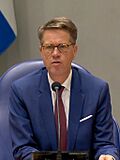 |
Martin Bosma (born 1964) |
Party for Freedom | 30 June 2010 (14 years, 300 days) |
30 November 2006 (18 years, 147 days) |
|
| First Deputy Speaker |  |
Tom van der Lee (born 1964) |
GroenLinks–PvdA | 14 June 2018 (6 years, 316 days) |
23 March 2017 (8 years, 34 days) |
|
| Second Deputy Speaker | 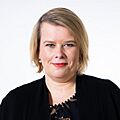 |
Roelien Kamminga (born 1978) |
VVD | 7 July 2021 (3 years, 293 days) |
31 March 2021 (4 years, 26 days) |
|
| Third Deputy Speaker | 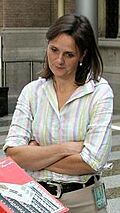 |
Nicolien van Vroonhoven-Kok (born 1971) |
New Social Contract | 19 December 2023 (1 year, 128 days) |
23 May 2002 - 12 May 2008, 18 August 2008 - 17 June 2010, 6 December 2023 (9 years, 70 days) |
|
| Fourth Deputy Speaker |  |
Wieke Paulusma (born 1978) |
Democrats 66 | 19 December 2023 (1 year, 128 days) |
15 April 2021 (4 years, 11 days) |
|
| Fifth Deputy Speaker | Henk Vermeer (born 1966) |
Farmer–Citizen Movement | 19 December 2023 (1 year, 128 days) |
6 December 2023 (1 year, 141 days) |
||
| Sixth Deputy Speaker |  |
Gidi Markuszower (born 1977) |
Party for Freedom | 19 December 2023 (1 year, 128 days) |
21 March 2017 (8 years, 36 days) |
|
Parliamentary committees
| Parliamentary committee | Ministry | Current chair |
|---|---|---|
| Parliamentary committee for the Interior | Ministry of the Interior and Kingdom Relations |
Kiki Hagen (D66) |
| Parliamentary committee for Foreign Affairs | Ministry of Foreign Affairs | Attje Kuiken (GL–PvdA) |
| Parliamentary committee for Finance | Ministry of Finance | Judith Tielen (VVD) |
| Parliamentary committee for Justice and Security |
Ministry of Justice and Security | Paul van Menen (D66) |
| Parliamentary committee for Economic Affairs and Climate Policy |
Ministry of Economic Affairs and Climate Policy |
Agnes Mulder (CDA) |
| Parliamentary committee for Defence | Ministry of Defence | Raymond de Roon (PVV) |
| Parliamentary committee for Health, Welfare and Sport |
Ministry of Health, Welfare and Sport |
Bart Smals (VVD) |
| Parliamentary committee for Social Affairs and Employment |
Ministry of Social Affairs and Employment |
Tunahan Kuzu (DENK) |
| Parliamentary committee for Education, Culture and Science |
Ministry of Education, Culture and Science |
Ingrid Michon (VVD) |
| Parliamentary committee for Infrastructure and Water Management |
Ministry of Infrastructure and Water Management |
Tjeerd de Groot (D66) |
| Parliamentary committee for Agriculture, Nature and Food Quality |
Ministry of Agriculture, Nature and Food Quality |
Jaco Geurts (CDA) |
| Select Parliamentary Committee | Ministry | Current Chair |
| Parliamentary committee for Kingdom Relations |
Ministry of the Interior and Kingdom Relations |
Mariëlle Paul (VVD) |
| Parliamentary committee for European Affairs |
Ministry of Foreign Affairs | Laura Bromet (GL–PvdA) |
| Parliamentary committee for Foreign Trade and Development Cooperation |
Ministry of Foreign Affairs | Jorien Wuite (D66) |
| Parliamentary committee for Building Supervision |
Ministry of Infrastructure and Water Management |
Ockje Tellegen (VVD) |
| Parliamentary committee for Petitions and the Citizen Initiatives |
Vacant | |
| Parliamentary committee for Intelligence and Security |
Sophie Hermans (VVD) | |
| Special Parliamentary Committee | Ministry | Current Chair |
| Parliamentary committee for Digital Affairs |
Roelien Kamminga (VVD) |
See also
 In Spanish: Cámara de Representantes de los Estados Generales para niños
In Spanish: Cámara de Representantes de los Estados Generales para niños


